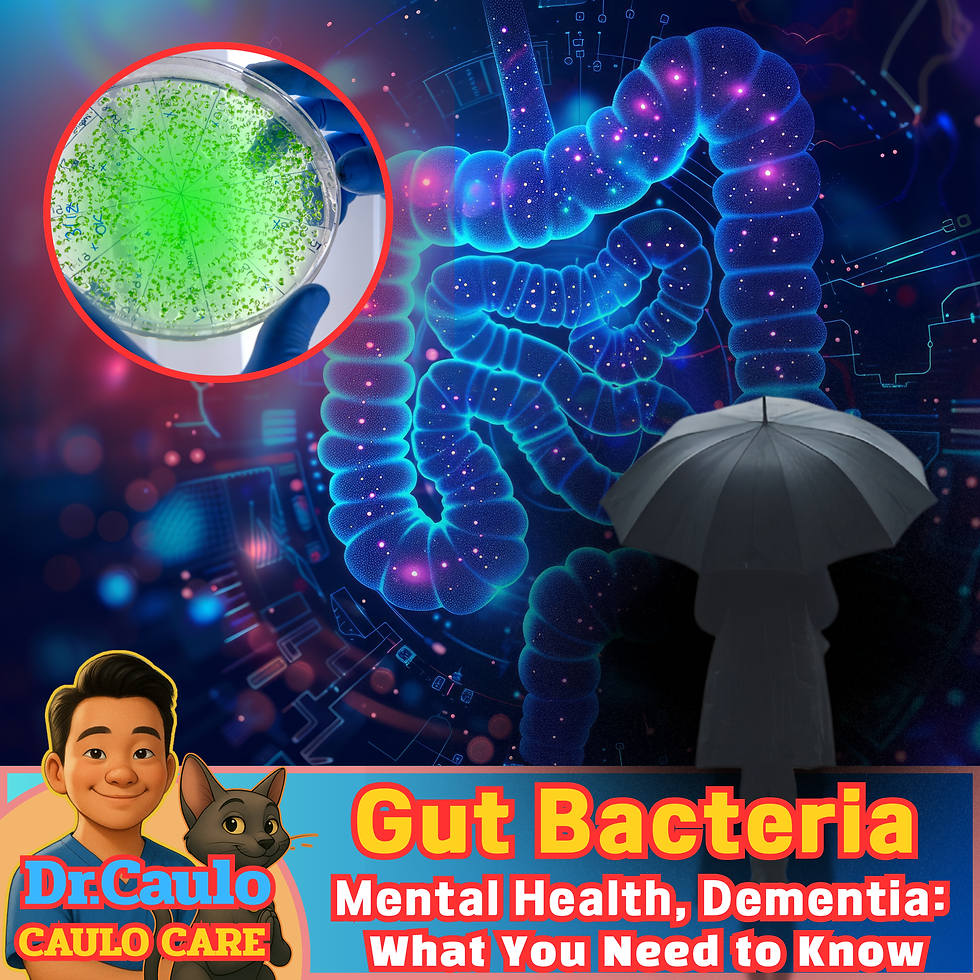Understanding the Connection Between Stress and Diarrhea in Your Nervous System
- caulocare
- Apr 24, 2025
- 6 min read

In today's fast-paced world, stress feels unavoidable. From the pressures of work and personal relationships to the demands of daily life, stress can show up in many uncomfortable forms. One less familiar consequence of stress is its significant impact on your digestive health, especially resulting in diarrhea. So, why does this happen? It all comes down to the complex connection between your brain and your gut, often called the "gut-brain axis." This article will dive into how stress influences your digestive system and what steps you can take to ease these bothersome symptoms.
The Gut-Brain Connection
Your gut and brain are in constant communication through a complex web of nerves, hormones, and other biochemical signals. This connection is crucial for maintaining both physical and mental health. When you experience stress, your brain sends signals that can disrupt your gut’s normal functions, leading to symptoms like diarrhea.
Studies reveal that when you're under stress, your body releases hormones such as cortisol and adrenaline. These hormones kickstart your body’s "fight or flight" response, diverting energy away from non-essential functions—like digestion—to face immediate threats. Research indicates that around 75% of individuals report GI symptoms due to stress, highlighting just how common this issue is.
This shift in energy can alter gut motility, the process controlling how fast food moves through your digestive system. For some, increased motility can lead to diarrhea. Anxiety or stress compounds the problem, creating a cycle that can leave you feeling uneasy and out of control.
The Role of the Autonomic Nervous System
The autonomic nervous system (ANS) is responsible for regulating involuntary bodily functions, including digestion. It comprises two main branches: the sympathetic nervous system (SNS) manages your body's stress response, while the parasympathetic nervous system (PNS) oversees relaxation and digestion.
When stress activates the SNS, it disrupts the balance of the ANS, leading to digestive issues. Conversely, when you’re relaxed, the PNS encourages gastrointestinal function to return to normal. It’s essential to remember that chronic stress can intensify this imbalance, making individuals more susceptible to GI disorders like diarrhea.
Symptoms of Stress-Induced Diarrhea
Recognizing the signs of stress-induced diarrhea is vital for taking charge of your health. Common symptoms include:
An urgent need to use the bathroom frequently
Watery, loose stools
Abdominal cramps or discomfort
Bloating or gas
If you notice these symptoms alongside stressful situations, it may provide valuable insight into how your stress levels are affecting your gut health. A study found that over 50% of individuals with IBS (Irritable Bowel Syndrome) report their symptoms worsen under stress, showcasing the importance of addressing stress levels.
Managing Stress for Better Gut Health
Understanding the link between stress and diarrhea is crucial, but effectively managing stress can help ease gastrointestinal symptoms. Here are some actionable strategies you can integrate into your routine:
1. Mindfulness and Meditation
Engaging in mindfulness and meditation can help calm your mind and activate the PNS, which benefits digestion. Techniques such as deep breathing, progressive muscle relaxation, or guided imagery are valuable tools for reducing stress and enhancing overall wellbeing.
2. Regular Exercise
Physical activity is a powerful stress reliever. Exercise releases endorphins, transferring your focus from stress to mood enhancement. Aim for at least 150 minutes of moderate exercise weekly, which can greatly benefit both stress management and digestive health.
3. Nutrition and Hydration
Eating a fiber-rich diet supports digestive health, while proper hydration is critical for normal bowel function. Focus on whole foods like fruits, vegetables, and whole grains—each serving at least 5 servings a day of fruits and vegetables can significantly improve digestion, even during high-stress periods.
4. Acupuncture and Massage
Consider therapies such as acupuncture and massage to promote relaxation and reduce stress levels. These practices can improve blood circulation and alleviate tension, beneficial for overall gastrointestinal health.
5. Seek Professional Help
If stress-induced diarrhea continues to disrupt your life, consulting with a healthcare professional is essential. They can help identify other underlying issues and suggest tailored therapeutic interventions based on your unique needs.
Lifestyle Adjustments for Balanced Gut Health
Beyond specific stress-management techniques, making lifestyle adjustments can enhance your overall gut health. Here are additional tips to help you thrive:
1. Establish a Routine
Creating a daily routine offers structure and helps minimize stress. Set consistent times for meals, exercise, and relaxation activities. This can lead to better organization and improved overall wellbeing.
2. Limit Caffeine and Alcohol
Both caffeine and alcohol can irritate the gut and worsen stress-related diarrhea. Moderation is key; consider replacing these beverages with soothing herbal teas or plain water to support digestive health.
3. Ensure Quality Sleep
Sleep deprivation can heighten stress levels and adversely affect your digestive system. Focus on quality rest by adhering to a consistent sleep schedule and adopting a calming bedtime routine.
4. Social Support
Connecting with friends and family can provide much-needed emotional support during stressful times. Sharing your feelings and engaging in fun social activities can help lighten your mood and positively influence your gut health.
Traditional Chinese Medicine (TCM) Explanation
“Why does stress lead to diarrhea?”In TCM, this is not just a digestive issue—it’s a disharmony between the Liver, Spleen, and digestive Qi (energy).
The Core Concept: “Liver Overacts on Spleen” (肝乘脾 / Gan Cheng Pi)
When you're stressed, Liver Qi becomes stagnant—meaning energy gets stuck.The Liver’s role in TCM is to ensure the smooth flow of Qi throughout the body, especially in emotions.
But when you're anxious, angry, or emotionally tense:
Liver Qi gets blocked ("Liver Qi Stagnation")
That blocked energy "attacks" the Spleen, which is responsible for digestion and transforming food into energy and fluids
The Spleen weakens → digestion becomes impaired → loose stools or diarrhea occurs
TCM Organ Roles in This Condition:
Liver (肝 – Gan)
Governs emotions and free flow of Qi
Stress, anger, overthinking → blocks Liver Qi
Causes Qi to move erratically, especially toward the intestines
Spleen (脾 – Pi)
Responsible for transforming food and transporting nutrients
Loves “warm and dry” — hates cold, damp, and emotional disturbance
Weak Spleen → poor digestion → undigested food in stool, fatigue, diarrhea
Emotional Stress = Qi Disharmony
Emotional tension doesn't just stay in your mind
It blocks Qi movement, leading to disharmony between organs
Symptoms According to TCM:
Sudden loose stools after emotional stress
Fatigue or heaviness after eating
Distended abdomen, bloating, soft or urgent stools
Irritability, sighing often, mood swings
Feeling of "fullness in the chest" or "tight rib sides"
TCM Solutions
Acupuncture Points
LV3 (Tai Chong) – Moves Liver Qi, releases stress
PC6 (Nei Guan) – Calms heart-mind, connects emotion to digestion
ST25 (Tian Shu) – Regulates intestines
SP6 (San Yin Jiao) – Strengthens Spleen and digestion
CV12 (Zhong Wan) – Harmonizes the middle burner (Stomach + Spleen)
Herbal Medicine
A common formula for this pattern: Xiao Yao San (逍遥散)
Harmonizes Liver & Spleen
Relieves stress, supports digestion, reduces PMS & mood swings
🔸 Herbs like:
Chen Pi (陳皮) – moves digestive Qi
Bai Zhu (白术) – strengthens Spleen
Fu Ling (茯苓) – drains dampness
Xiang Fu (香附) – spreads Liver Qi
Diet in TCM Style:
Eat warm, cooked foods like congee, soups, and steamed vegetables
Avoid raw, cold, greasy, and spicy foods
Drink warm ginger or Chen Pi tea after meals
Reduce sugar and dairy (they promote Damp)
Lifestyle Tips:
Gentle movement like walking, tai chi, or yoga
Regular mealtimes
Emotional expression—don’t bottle things up
Daily acupressure or belly breathing for 5 minutes
Summary (TCM View):
“Stress causes Liver Qi to stagnate. This stagnant energy disrupts the Spleen’s ability to digest and transform food, leading to diarrhea and fatigue. The key is to soothe the Liver and strengthen the Spleen.”
Embracing Better Gut Health
Understanding the connection between stress and diarrhea involves acknowledging how your brain and gut interact. By recognizing stress as a significant factor affecting your gastrointestinal health, you can take charge and make proactive changes. Implementing stress reduction techniques, embracing a healthier lifestyle, and seeking professional support when necessary can lead to significant improvements in your digestive wellbeing. Commit to prioritizing your mental and physical health, and you will find the balance that supports a happier, healthier life.
This information is only educational and should not be construed as medical advice.
Everything must be balanced, and the suggestions may not apply to you.
A specialist doctor should be consulted for any medical advice or diagnosis.
BOOK AN APPOINTMENT NOW!
Acupuncture near me at Forest Hill, NY
🔶🔷🔶🔷🔶🔷🔶🔷🔶🔷🔶🔷
Dr. Phumlarp Caulo LA,c, MAc. OM, DAHM
Doctor of Acupuncture/Chinese Medicine
Caulo Care Acupuncture
🔖 By appointment only
☎️+1 (929) 269-4549




Comments